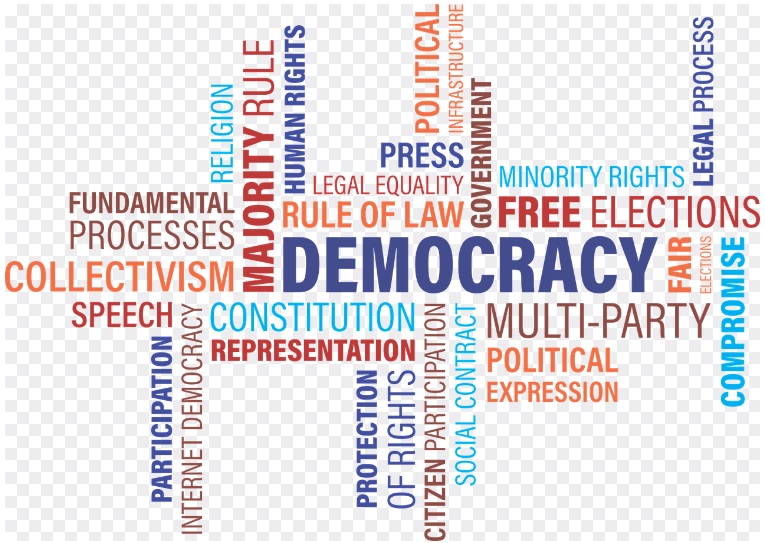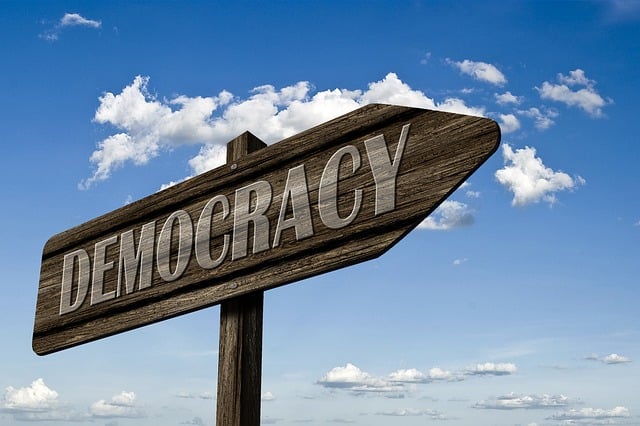Shari Davis, co-executive director of the Participatory Budgeting Project, shares how we can achieve a fair and equitable democracy through participation. Listening is an essential ingredient — without it, we limit our ability to work together and incorporate what we’ve heard from others into the path forward.
Fill in the video excerpt with the words in bold below:
advocate redesign (noun) indigenous middle ground
represent equitable count purpose
(…) The Unites States was built with the stories of people from all over the world. And the people that shaped our democracy included 1. ………… individuals, black and brown women, folks that were part of the abolitionist movement. But when we think about the future of democracy and making it fair and 2. ……….., that’s not something that most people have experienced. And it’s an opportunity for us to live in to the promise of democracy.
Democracy needs a 3. …………… . And what that presents us is an opportunity to reimagine a democracy that works for everyone.
So everybody, I want you to close your eyes for a second and I want you to think about your wildest dream for democracy.
1st speaker: Just to have that freedom, that freedom of choice and the freedom to know that I 4. ………. , what I say and what I believe in has 5. ……………, and hopefully someone will be there to 6. ……….. me and what I feel will be good for all.
2nd speaker: (…)
3rd speaker: I think about people coming together to really 7. …………… for what they want to see.
4th speaker: If we may have a different opinion, we can find a 8. …………………. . (…)
Now watch the video and check your answers.
Key: 1. indigenous; 2. equitable; 3. redesign; 4. count; 5. purpose; 6. represent; 7. advocate; 8. middle ground
Glossary
- indigenous /ɪnˈdɪdʒ.ɪ.nəs/– living, or occurring natively or naturally in a particular region
- equitable /ˈek.wɪ.tə.bəl/- fair and reasonable in a way that gives equal treatment to everyone
- participatory – involving a particular person or group of people
- naturalization – the admittance of a foreigner to the citizenship of a country
- tapestry – something that is made of many different parts
- woven (past participle of weave) – (here) put together
Practice makes perfect
WORD FORMATION: Change the word in CAPITALS to fill in the blanks.
Democracy has been so 1. …….. [WIDE] embraced not because of some vague yearning for human rights but because under certain conditions it is a more “efficient” form of social 2. ………… [ORGANIZE]. (Our concept of 3. ………… [EFFICIENT] includes the ability to survive and prosper.) It is not 4. ………….. [ACCIDENT] that those nations of the world that have endured longest under conditions of relative wealth and 5. ……………. [STABLE] are democratic, while authoritarian regimes have, with few exceptions, either crumbled (=collapsed) or eked out (=obtained) a precarious (=insecure) and backward 6. …………. [EXIST]. (…)
Democracy (whether capitalistic or socialistic is not at issue here) is the only system that can 7. ……………. [SUCCESS] cope with the changing demands of contemporary civilization. We are not necessarily endorsing democracy as such; one might reasonably argue that 8. …………… [INDUSTRY] civilization is pernicious and should be abolished. We suggest merely that given a desire to survive in this civilization, democracy is the most effective means to this end.
In order to read the whole article, go to: https://hbr.org/1990/09/democracy-is-inevitable
Key: 1. widely; 2. organization; 3. efficiency; 4. accidental; 5. stability; 6. existence; 7. successfully; 8. Industrial
Discuss:
How does democracy contribute to survival and prosperity compared to authoritarian regimes?
The text above claims that authoritarian regimes, with few exceptions, have either crumbled or lived in a backward existence. Do you agree with this view? Can you think of any authoritarian regimes that have been relatively successful or stable? What might account for their endurance?
Democracy seems the only system that can handle the changing demands of contemporary civilization. Do you believe that this holds true today, given the rise of new authoritarian regimes? How do modern authoritarian regimes adapt to the contemporary world?
Given the challenges faced by democracies today, such as political polarization and economic inequality, do you think democracy will continue to be the most “efficient” system for survival? What reforms or adaptations might be necessary to maintain its efficiency?
Watch and revise!
Redesigning Democracy_ A Vision for an Equitable Future
https://www.cloud.worldwideschool.pl/index.php/s/jggkPdRmytmjcHL
(5221)






